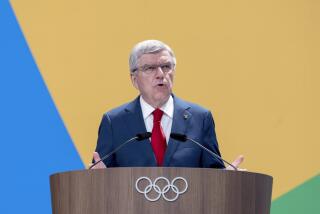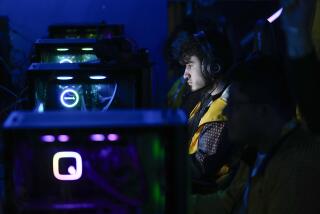Korean Olympic Problem Comes to Head This Week
- Share via
LAUSANNE, Switzerland — Representatives of North Korea and South Korea meet with International Olympic Committee officials this week in what may be a last attempt to save the 1988 Games from a political boycott.
The sessions at IOC headquarters Tuesday and Wednesday will be the third since North Korea demanded last year that it co-host the Olympics, which were awarded to the South Korean capital of Seoul in 1981.
Seoul organizers say they won’t allow the North to co-host, but add they will listen to any “reasonable proposal.”
Sources said one plan to be discussed would place all or part of four sports--cycling, soccer, table tennis and archery--in the North.
A London newspaper, the Observer, reported last month that agreement was very near on a similar proposal, this one involving table tennis, badminton and some track.
But the sources, speaking on condition they not be identified, said there has been no change in the positions of the two sides since the last joint meeting here in January and subsequent separate meetings between IOC President Juan Antonio Samaranch and representatives of both countries.
If no agreement is reached at this session, it will be too late for further discussions, according to Samaranch.
And if that happens, Samaranch said in an interview in April, North Korea “will not come to Seoul.”
The sources emphasized last week that time is rapidly running out on the North-South dispute.
Should the Pyongyang government order its athletes to stay away, it could mean that communist Eastern-bloc countries would follow. If that happens, it would mark the fourth consecutive Summer Games to be hit by a political boycott.
The two sides won’t get together right away in Lausanne.
Michele Verdier, the IOC spokeswoman, said Samaranch and other committee officials would meet separately with the North and South delegations in morning and afternoon sessions Tuesday.
The first face-to-face meeting, she said, will be a joint dinner that night.
On Wednesday morning, the two sides will meet again at Chateau de Vidy, the Lake Geneva mansion that is the IOC’s headquarters. A news conference by Samaranch at 12:30 p.m. Lausanne time at the Palace Hotel will mark the end of the session.
The Korean peninsula has been in political turmoil since the end of World War II, and the dividing line between North and South has been the 38th parallel since a three-year “conflict” ended in cease-fire in 1953.
United Nations-sponsored peace talks are held periodically, but agreement has never been close. Samaranch acknowledged in April, during an IOC meeting in Seoul, that the political divide between North and South was the ultimate stumbling block to an Olympic compromise.
“With the two Germanys, we have had some successes,” he said. “Sometimes, we can go further than the politicians. But here I am afraid it is a political problem.”
South Korea has changed from a relatively undeveloped nation of farmers and fishermen to a state-of-the-art technological giant in the last decade, exporting computers, televisions and automobiles worldwide.
Seoul is bustling with activity, from new hotels and office towers to an expanded subway system.
The government of President Chun Doo-hwan is the target of demonstrations, chiefly involving university students, demanding direct presidential elections next year.
But Chun has said that, even if he does step down, there will be no direct elections before the Olympics.
The Seoul government is looking at the Games as an opportunity to win international endorsement of its revitalized and reshaped economy, especially in comparison with the relative undeveloped economy of the communist North.
More to Read
Go beyond the scoreboard
Get the latest on L.A.'s teams in the daily Sports Report newsletter.
You may occasionally receive promotional content from the Los Angeles Times.






